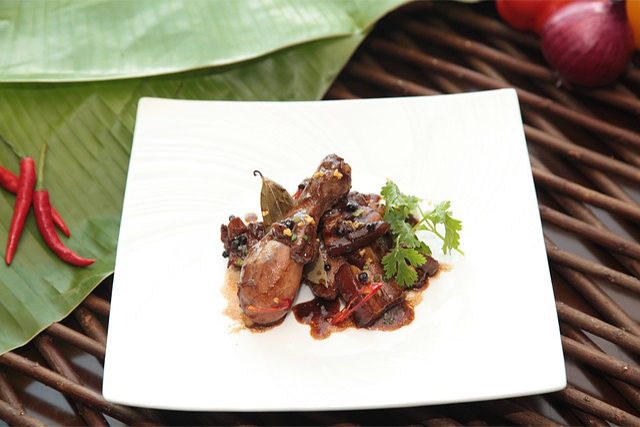The Department of Trade and Industry (DTI) over the weekend drew flak on social media after it formed a technical committee on Filipino dishes, which aims to standardize the recipe of adobo and other popular Philippine dishes.
How the public reacted
Far Eastern University law dean Mel Sta. Maria questioned the DTI’s move saying it is a “classic waste of gov’t time, effort, and money.”
“May standards for adobo and sisig. Pero ipatatanggal ng DOLE Sec ang board at bar exams,” a journalist and editor said, alluding to the proposal of the Labor Secretary Silvestre Bello III to abolish the licensure examination.
Other government officials also joined the online buzz over the Filipino dish.
“The reaction to adobo is overblown, IMO,” Commission on Elections spokesperson James Jimenez tweeted.
“The next thing you know, they’ll be appointing a czar/czarina for adobo, sisig, sinigang, and lechon standards,” Former Supreme Court spokesperson Theodore Te jokingly said in a tweet.
A professor called out DTI and hilariously said “maraming dapat unahin na mas importante. Halimbawa iyong ipagbawal niyo ang hiwa ng abomination na luya sa chicken arrozcaldo na sinlaki rin ng manok!”
Amid the online debate over the Filipino dish, a Twitter user said, “Philippine gov’t trying to put standards on cooking adobo while most Pinoy these days can’t even cook the dish due to [the] high price of pork.”
Based on the latest Department of Agriculture Bantay Presyo report, pork products now cost around P310 to P390 in selected markets in Metro Manila.
A professor also expressed his opinion online and said, “Standardization goes against the very grain of Philippine traditional cultures, where every person or community has the creative freedom to make its own version of a dish—resulting in great richness and variety,”
The online user also wondered whose recipe will the government follow as a standard for the Filipino dish.
“There is no such thing as a generalized recipe like there is no generalized human face. Every recipe is unique, just like every face is a particular face,” he added.
Rep. Ruffy Biazon (Muntinlupa City) likewise questioned the move of DTI.
“I’m a believer in the diversity of adobo. Why set a national standard?” he asked.
Some online users created artworks and memes in response to the controversial DTI’s plan.
Suggestions
Others jokingly suggested that the government should instead create a national standard for afritada, caldereta, menudo, and mechado to end the confusion over these Filipino dishes.
Sa gitna ng napakataas na presyo ng bilihin, sa dami ng scam online, at sa dami ng dapat i-improve sa consumer rights act, ang naisip talagang gawin ng DTI ay standardize ang adobo? Matuwa pa ako kung nagclarify na lang sila ano pinagkaiba ng mechado, afritada, at caldereta eh 😅
— Angelica Reyes (@missanjreyes) July 10, 2021
National standard for Adobo? What a waste of time.
Instead, create a national standard to distinguish Afritada from Caldereta, Menudo, and Mechado. That will be more helpful.
— James Miraflor 🔻 (@futilityfunc) July 10, 2021
The four dishes often confuse Filipino diners given their similar ingredients and appearances. Most of these dishes are tomato-based.
In DTI’s defense
DTI – Bureau of Philippine Standards Director Neil Catajay said that “standardizing the basic cooking technique for Philippine adobo will help ordinary citizens, foodies, and food businesses to determine and maintain authentic Filipino adobo taste.”
Recognizing the diverse cooking methods and ingredients for adobo, the trade department noted that the standard would set common elements defining the Filipino dish.
Chef Myrna Segismundo, who is part of the committee developing the standards, said that there will be different approaches and opinions (on cooking adobo).
“As long as I have, say one to three steps, it’s this recipe. Anything else you add to it is a variation to the cooking technique,” she said.
DTI on Sunday clarified that the adobo recipe “standard” is not mandatory for local households saying it will only be for international promotions.










